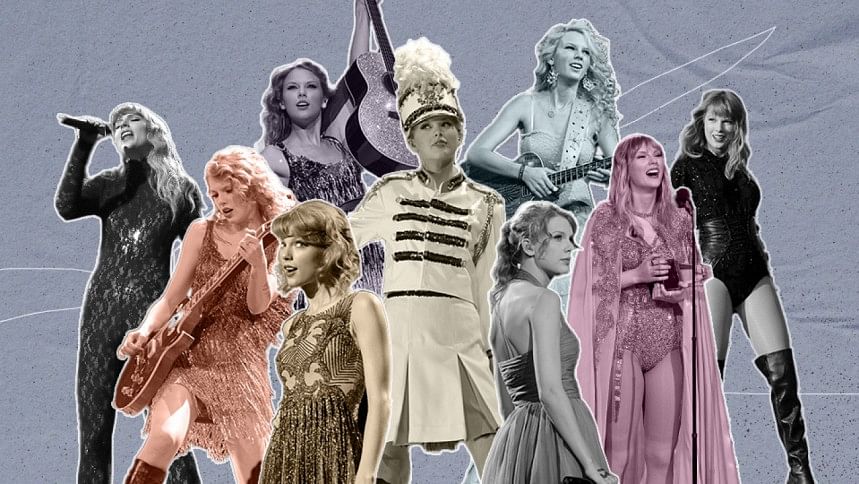How Taylor Swift's bold feminist move redefined music ownership

In a bold move, Taylor Swift re-records her first six albums to reclaim ownership from Scooter Braun, highlighting her fight against male control in the music industry. The re-releases, marked as "(Taylor's Version)", not only mirror the originals but also include unreleased tracks. Swift's stance resonates beyond music, shedding light on sexism in workplaces. Her influence extends to mentoring emerging talents like Olivia Rodrigo, emphasising the importance of owning one's work.
By confronting the manipulation she faced, Swift emerges stronger, symbolising a broader battle against misogyny. At 31, she triumphs, not just in music but in reclaiming her career and paving the way for women to challenge systemic biases.

Swift's saga unfolded when she relinquished control of the music copyrights to her first six albums, a consequence of the convoluted contracts that often entrap artists in the early stages of their careers. The acquisition of Swift's original label, Big Machine, by music mogul Scooter Braun intensified the conflict as he gained ownership of Swift's master recordings—a move that reverberated through the industry.

Braun's subsequent sale of Big Machine to a private investment fund for a staggering sum marked a pivotal turning point. In the wild world of the music biz, Taylor Swift spills the beans on a tough pill she had to swallow. Picture this: her precious tunes, the ones she crafted with heart and soul, suddenly treated like a real estate deal. No heads up, no chance to buy her own creations. Scooter Braun's gang, backed by big shots, swoops in and grabs it all. What's worse? No one bothers to shoot her a text or give her a ring – like, "Hey, Taylor, what's the 411?" It's not just about the music; it's her whole vibe – photos, handwriting, album designs, you name it. Scooter doesn't even slide into her DMs before or after the deal—a classic toxic male privilege in the music scene. People say, "He's always been nice to me," but Taylor's left feeling hurt and ghosted.
Confronted with the loss of control over her original recordings, Swift made a strategic and unprecedented decision—she would re-record her albums to regain ownership of the compositions. This move, while legally allowed, had ramifications that extended beyond the courtroom. Swift's re-recordings not only diluted the value of the original masters but also redirected revenue streams to her new versions.
Understanding Swift's strategic move requires a nuanced comprehension of music copyrights. Two primary copyrights come into play: the musical work copyright, protecting the composition, and the sound recording copyright, safeguarding the actual recorded version of the music. Swift, having lost the sound recording copyright, retained control over the musical compositions—a crucial distinction that shaped her subsequent actions.

Impact on the music industry
Swift's decision to re-record her albums and assert control over her compositions represents a potential paradigm shift in the music industry. It challenges the traditional power dynamics where labels retain ownership of masters long after artists have created the music. The move empowers artists to navigate the industry with greater agency, potentially influencing future negotiations and contracts.
The private investment fund's refusal to engage with Swift regarding her masters showcased a missed opportunity. By not collaborating with the original artist, the fund failed to maintain the value of the original masters. Swift's re-recordings, sounding virtually identical to the originals, competed for market attention, impacting the economic potential of the original versions. This aspect highlights the delicate interplay between ownership, artist loyalty, and economic viability in the music industry.
The Swift Effect

Swift's fans played a pivotal role in her strategic manoeuvre. Embracing the new recordings, fans contributed to the success of the re-recorded albums, propelling them to #1 on the Billboard charts. This shift in fan loyalty not only generated revenue for Swift but also reshaped the narrative around ownership and artist rights. The connection between artists and their audiences has proven to be a formidable force in influencing industry dynamics. Aside from all the business and music industry talk, Taylor Swift's redoing her old songs is a big deal for fans.
You know "All Too Well", that killer track that was 5 minutes long? People always talked about a 10-minute version, and guess what? Taylor dropped it in 2021 with "Red (Taylor's Version)". It's like getting a double dose of your favourite song. But that's not all – we're also getting new music videos for these old hits. Songs that hit the scene a decade ago are getting a fresh look with videos that scream 2023.

For fans, it's not just nostalgia; it's like Taylor's bringing the past into the present. Long story short, Taylor Swift redoing her stuff is like hitting the jackpot for fans. It's not just reliving the good times; it's like upgrading them and making the connection between then and now way stronger. Props to Taylor for giving us this musical time-travel experience.
The Ripple Effect
Swift's bold move sends a resounding message to artists of her generation and those to come. By taking control of her music, she sets a precedent for others to assert their rights in an industry historically marked by exploitative contracts and power imbalances. The ripple effect may inspire a new era where artists prioritise ownership and autonomy, challenging established norms and fostering a climate of empowerment.

Historically, female artists have faced challenges in asserting control over their artistic creations, often falling prey to unequal power dynamics within the industry. Swift's bold initiative serves as an empowering example for women, showcasing that they can navigate and challenge traditional structures, ensuring ownership and autonomy over their musical legacies. By reshaping the narrative around music ownership, Swift's actions contribute to a broader shift in the industry culture, fostering an environment where women artists can assert their rights, negotiate equitable deals, and redefine their roles in an industry traditionally dominated by male figures.
Taylor Swift's journey from losing control of her masters to reclaiming her compositions through strategic re-recordings is a testament to her resilience and business acumen. Beyond personal victories, Swift's actions mark a pivotal moment in the music industry, prompting a reevaluation of artist-label dynamics and empowering musicians to navigate a landscape where ownership and control matter more than ever. As the industry watches the unfolding repercussions, Taylor Swift stands as a trailblazer, leading the way toward a new chapter in the ever-evolving narrative of the music business.

 For all latest news, follow The Daily Star's Google News channel.
For all latest news, follow The Daily Star's Google News channel. 










Comments